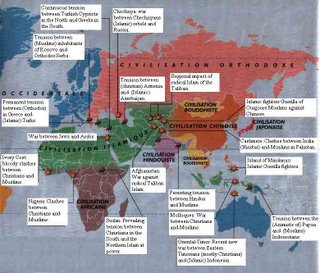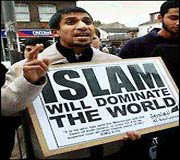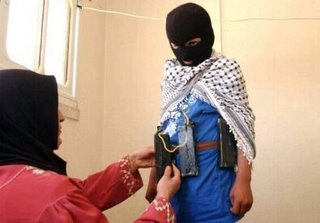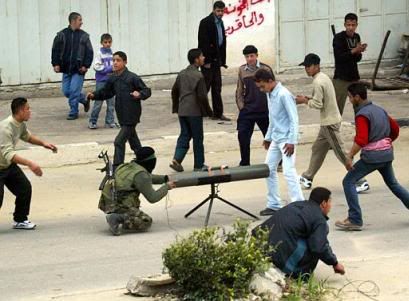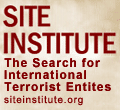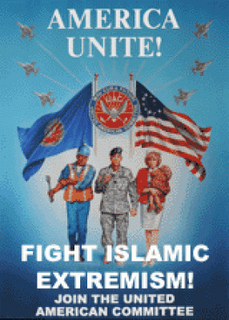Tuesday, August 29, 2006
The Islamic Inquisition by Jamie Glazov
The Islamic Inquisition
By Jamie Glazov
FrontPageMagazine.com April 25, 2006

Frontpage Interview's guest today is Ali Sadeghi, a former political prisoner in Iran. He is the author of the forthcoming book
FP: Ali Sadeghi, welcome to Frontpage Interview.
Sadeghi: Thank you.
FP: Tell us a bit about your background and how you ended up being imprisoned in
Sadeghi: My story begins in college. In 1996, I entered college as an engineering student with a fantasizing mind about how to fulfill all my suppressed desires through the supposedly open environment of the university. Soon I realized the colleges in
Furthermore, the famous backlash of 1999 took place in
By the way, I was arrested too, and, ever since, I have been carrying the mark of a dissident, being captured several more times in different occasions thereafter, no matter whether I was involved in any activities or not.
FP: I apologize for asking this, but can you describe some physical and mental tortures that the regime inflicted on you and other prisoners?
Sadeghi: Once somebody tends to oppose the government in
The term torture, according to the heartrending experiences of many freedom fighters in
FP: The last time you were arrested, you were prosecuted not only as a dissident, but also as an infidel. Can you talk about that?
Sadeghi: In my last imprisonment, although my initial accusation was similar to the previous times namely taking part in student movements, the Intelligence Service discovered in my apartment some proofs denoting I had anti-Islamic attitudes and anti-religious views in general. These proofs mostly included my own "unpublished" critiques on religious culture and Islamic contexts, also a short psychoanalysis over the process of producing suicide bombers. Moreover, I had a vast collection of "prohibited books" in my house. These evidences could result in my death sentence, for according to Islamic law of Shari'a, apostates to Islam are condemned to death.
FP: Tell us how you survived and how were able to win your freedom.
Sadeghi: Simply, I accepted death. During the interrogations, once the threat of being sent to the court as an apostate reached to the extreme, I just faced the risk without thinking twice, and asked the Interrogators to do their best to get me executed.
My expected miracle happened, and they refrained from sending the mentioned evidences to court for mere one reason: I had the support of the media. If they had executed me because of some unpublished critiques, in the blink of an eye the whole world would have been informed via my very active journalist friends. This could cause a human rights crisis for the government which was already going through a rough time because of the causalities of the suppression of young students in some recent backlashes.
Hence, they just released me on bail, and I instantly left the country before they could find any chance to "secretly" carry out the mortal command of their ideology. Iranian intelligence mafia has a well-known reputation of secretly murdering intellectuals when it's not possible to openly hang them before the eyes of the world.
In so many words, the main factor which saved me was the potential power of the media. Of course, the process of such survival was much more complicated than I describe here. I have written it all down in my book which will be published very soon.
FP: Tell us a bit about the book you are writing.
Sadeghi: My book, "
FP: Why do you think that, at the foundation of the Mullah tyranny, there is such a demonization of women and sexuality?
Sadeghi: Demonization of sexuality rises from the essence of all religions, as in Christianity the man himself is the fruit of "sin". In case of Islam, however, we notice some more excessive attributions that are being already discussed all over the world today.
Depending on the psychology of people, religion either makes them better people or brings the worst out of them, and, an ideological mindset can cause crucial destructions with an entirely clear conscience. Now, once a governmental system is based on such harmful mindset, the consequences are obvious.
Islam is a political ideology, having served its fossilized ideologists during the history, and it firstly and mostly attacks the most sensitive cells of the body of the society: women. According to Islamic laws, women's inheritance is half the amount of men; and the right to divorce is basically given to men. Men's right of polygamy is another mentionable example, and so on.
Such ideology justifies and gives power to Mullahs to enslave and paralyze half the society, namely women. The other half, of course, are never left in peace either.
The consequence of sexual oppression in
FP: What do you think of the Mullahs' attempt to get a hold of nuclear weapons? It appears that any day now they will have the capacity to launch a nuclear strike. They have already made it clear that they are ready to use them, especially against Israel. This is a terrifying situation. What are your thoughts? What can and must the West do?
Sadeghi: Needless to say, this is a confusing situation. "The right for the peaceful use of nuclear energy" is a disguise the Mullahs have been using for getting nuclear weapons. However, possessing nuclear weapon is a different matter than "using" them. Even if the Mullahs get to nukes, I think they will never have the guts to nuke Israel. But, if Iran is attacked by the West, I am sure Israel will be the first target for the Mullahs' bloody revenge, and then, of course, the whole world will be united against Iran, and Ahmadi Nejad's schizopherenic dream to wipe out another country from the world will result in complete destruction of Iran itself. Causalities of such conflict will be beyond retrieval for all sides of the conflict.
Another aspect of the crisis is that if the West takes military measures against Iran in any sense, the Mullahs will get a chance to, under the motto of "national unity", savagely suppress all the internal opposition rising from people, and this will strengthen the bases of clerical power, prolonging their empire.
The solution: Europeans must stop flirting with the Mullahs, and must try, by any means, to convince Russia and China to stop backing the Mullahs up. This is a crisis impossible to solve through soft negotiations or politically correctness. Sides must be taken clearly, and no one should slightly doubt or underestimate the growing danger of "clerical nukes". Yet, the core of the solution is a regime-change in Iran by supporting the opposition of Iranian people against theocracy. If we Iranians are assured of the West's support, we can take down the clerics. If, however, we feel we will be betrayed, we'll have a very slim chance for victory.
FP: Well, I have to say I am a bit more pessimistic than you my friend. I don't think the Mullahs lack any courage to use nukes if they have them. This is not a matter of courage. It is a matter of a death cult getting WMDs in its hands. Death cults yearn to perpetrate mass death and suicide -- and that is why they perpetrate mass death and suicide. So when this death cult gets its hands on nuclear weapons, it will do exactly that what it yearns to do, and we simply can't take the risk of sitting around waiting to see what will happen.
You touched on the Iranian people overthrowing their dictators and how the West can help. Let's close on that note. What is the future of
Sadeghi:
What is needed from the free world is to politically support the oppositionist movements of Iranian people against theocracy. Physical removal of the oppositionists especially intellectuals and authors by the Mullahs' government should be abolished by any means of political pressure.
And this also goes to the issues of political prisoners and freedom of expression. This way, steps to democracy will be taken by this nation deliberately, completely, and maturely. And, this way, instead of a terrorist State, we'll have a "real" secular
But, of course, we have a strenuous way ahead of us before reaching this point.
FP: Well sir, democracy came to Japan and Germany by military defeat. At this very moment there is an incredible process of democratization occuring in Iraq --thanks to America. A brutal and sadistic dictator is gone and there have already been three historic elections there in 2005 -- thanks to the American liberation.
Sadeghi: One million Iranian lives were lost in 8 years of demolishing war with Saddam. Of course I am happy he is gone. However, I am also deeply anxious
about the consequences of another war for both Iranian people and the West. In this special phase of time, interests of Iranians and the West especially
Americans clearly meet, and, to preserve these interests, any decision should be made wisely, with calculating how to pay the least price to stop the ideological terror of the Mullahs. My nation is a victim of terrorism as well as the American nation.
FP: To be sure, if the U.S. will act, it will do only because it has the responsibility to stop a death cult from pereptrating mass death and suicide. And I don't know of any powers in the world that can beat the U.S. and Israel in its record of agonizing about how to cause the least amount of casualties in war on both sides.
In any case, Mr. Sadeghi, our hearts are with the Iranian people, and we hope that they will be able to free themselves from the tyrants that rule over them now, and that the West can help in the best and most effective way.
Thank you for joining us today.
Sadeghi: My pleasure. Thank you for the great job you do.
Click Here to support Frontpagemag.com.
Jamie Glazov is Frontpage Magazine's managing editor. He holds a Ph.D. in History with a specialty in Soviet Studies. He edited and wrote the introduction to David Horowitz’s new book Left Illusions. He is also the co-editor (with David Horowitz) of the new book The Hate America Left and the author of Canadian Policy Toward Khrushchev’s Soviet Union (McGill-Queens University Press, 2002) and 15 Tips on How to be a Good Leftist. To see his previous symposiums, interviews and articles Click Here. Email him at jglazov@rogers.com.

